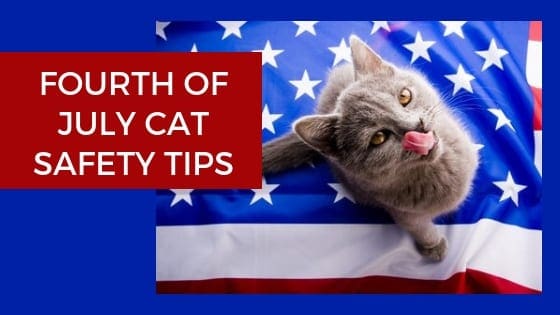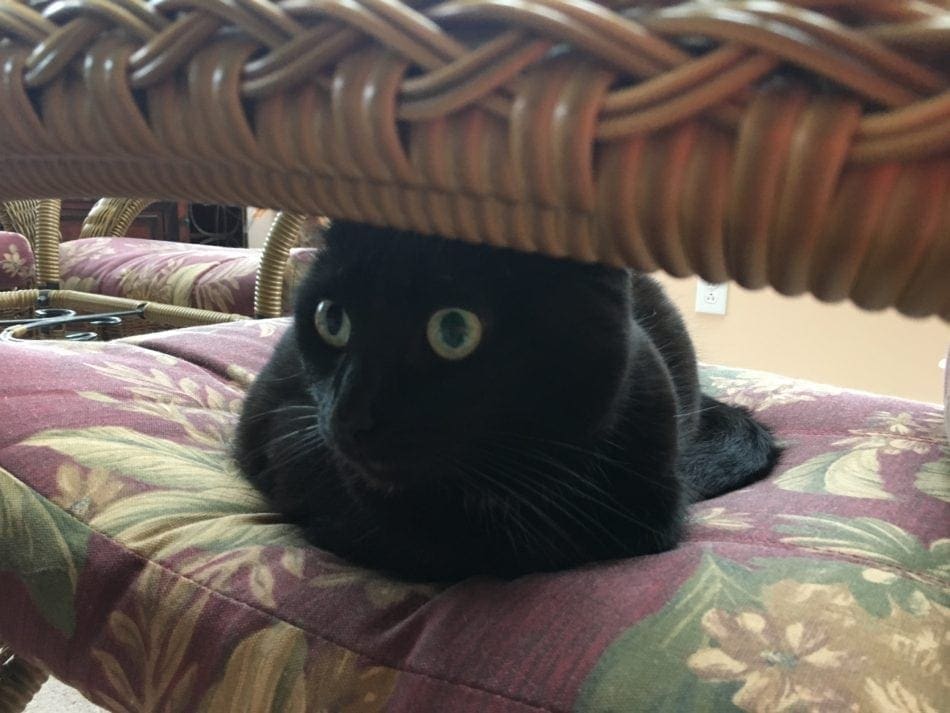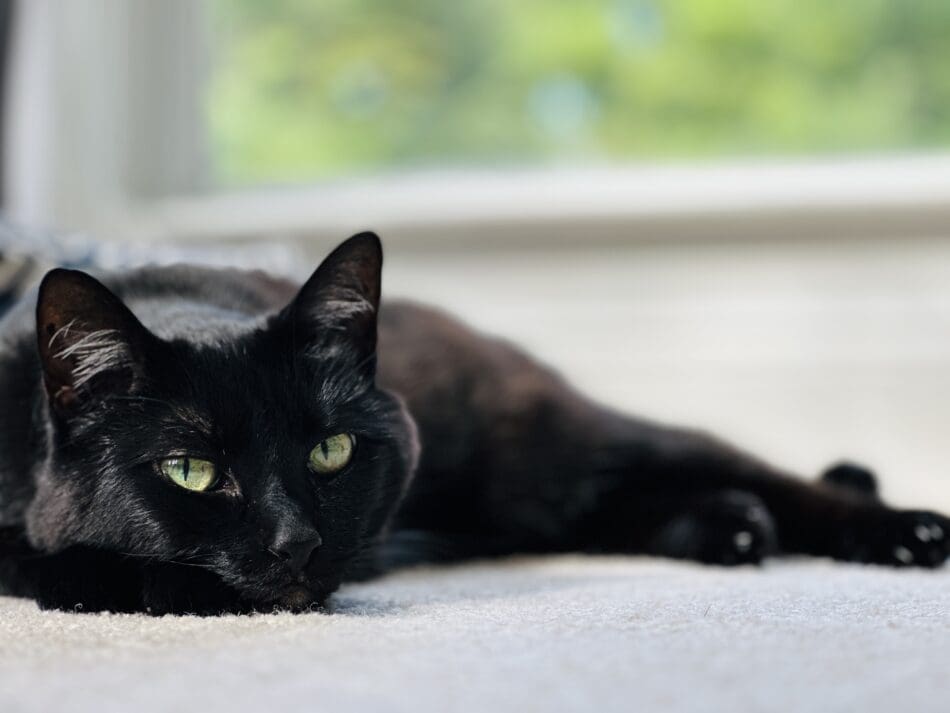
July 4th is a day filled with family cook-outs, fireworks, swimming, and in general, good times… for the humans, that is. For pets, Independence Day can be a day (and night) of unsettling noises, separation from the family, confusion and danger. In many cases, the celebration noises start days before the 4th and extend for days afterward.
Here are some tips to help keep your cat safe during this holiday.
Keep Your Cat Indoors
Even if you have a cat who is extremely street savvy, the sudden noise of firecrackers going off in the neighborhood can cause kitty to become fearful and disoriented. It’s not only the frightening noise that can cause panic, it can also be the burning smell of the firecrackers. A day that we associate with so much celebration is filled with things that can create panic in our animals.
Sadly, there are also some mean people in this world who delight in deliberately frightening animals by tossing firecrackers in their direction. It would be very easy for a cat or dog, trying to escape, to end up running right into oncoming traffic.
Many people begin their fireworks fun days in advance of July 4th and continue on until their supply has run out. If that’s typically the case in your neighborhood, bring your cat in advance of the holiday and don’t let him back out until everything has returned to normal.

If you have an exclusively outdoor-only cat, bring him indoors to keep safe from the noise and danger of firecrackers. Veterinary clinics are very busy on July 5th treating the panicked and injured pets who were outdoors during the July 4th holiday. You don’t want to spend July 5th at the veterinary hospital.
Be Careful Going in and Out
If you’re having a cook-out, be careful as you go in and out the door to prevent an unwanted escape. Double check that doors are securely latched and that window screens don’t have any tears. Cats can easily push through a flimsy screen. If windows must remain open, crack them just a small amount to avoid an escape.

Photo: Pam Johnson-Bennett
Update Identification
Even if you always keep your cat indoors, make sure identification is current. It’s easy for a kitty to slip out the door while in a panicky state and end up lost, injured or even dead. Microchipping is the safest method of identification but it’s no good if you haven’t updated your information with the registry. If collars with identification are used be sure the information on the tag is current. Surprisingly, I’ve come across many families who don’t pay attention to the fact that the phone number on the ID tag is an outdated cell number.
Set up a Sanctuary Room
If you’re having guests over or you’re going to be away, set up a sanctuary room for your cat that includes some safe hiding places and all the resources needed. A sanctuary room will better ensure your cat’s safety if you have company going in and out of the house during a BBQ or outdoor celebration. Periodically, go in and check on your cat in a very casual way just to see how he’s doing. Some cat parents have had success with using pheromone therapy as a calming method. If your cat reacts favorably to Feliway, plug in the diffuser in the sanctuary room or wherever your cat is spending the most time.
Take a Current Photo
If you’re like me, you’re always snapping photos of your cat but just in case you haven’t taken one in quite a while, have a current photo ready just in case your cat does get lost.

Photo: Pam Johnson-Bennett
Don’t Leave Your Cat Home Alone
If your cat does react to the noise of fireworks or if he shares his home with a dog who gets very fearful of the noise, don’t leave your pets home alone. Consider staying home instead of going out on that night. If you will be away during this time and hire a pet sitter or ask a neighbor to visit, be sure they know to be extra careful entering and exiting through exterior doors to prevent your cat from suddenly making an escape.
Use Distraction
If your cat is getting anxious about the noise going on outdoors, distract with interactive playtime. Keep your body language and tone very casual so that you send a message to your cat that all is ok in his world. If your cat is in a sanctuary room because you have company over, periodically go in and check to make sure kitty is calm, and perhaps do a little impromptu play session. YouTube has lots of interesting videos that showcase fish, birds and other critters that will keep kitty amused and distracted.
Use Music as a Buffer
Play soft music to block out the noise taking place outdoors. If you must go out and leave your cat alone, it may be a big help to have music playing in the various rooms your cat tends to favor.
Create Safe Hideaways
Most cats feel safer when they feel they’re not so out in the open. Create some hideaways for your cat by setting up a high-sided bed (a donut bed or “A” shaped bed) or even just put a few boxes on their sides and line them with towels. This may help limit how much time your cat spends hiding under the bed or in a closet. If your cat feels there’s a safe hiding option in the room where the family is, he may be more likely to stay with you.
Keep Cats on Their Normal Diet
Picnic and BBQ foods aren’t appropriate for pets and can cause problems ranging from mild stomach upset to extreme toxicity. The same applies to alcoholic beverages. All of these foods and beverages must be kept out of reach of your pets and all guests to your home need to be made aware of the rules about not offering these things to your cat or dog.
Keep Matches, Lighters and Citronella Candles out of Reach
Even inhaling the citronella scent can cause irritation to your cat so keep all of these things out of your pet’s reach. Make sure your dog doesn’t have access to matches or lighters that could get chewed on or ingested.
No Glowsticks
The popular glowsticks that kids wear as jewelry or use outdoors at night can cause irritation if chewed. Keep these things out of your pet’s reach.
Medication
Don’t give your cat any calming medication unless you’ve been instructed to do so by your veterinarian. You don’t know what side effects may occur or how your cat may react to a particular medication the first time it’s administered. There are OTC calming supplements available, but don’t administer any of those without first consulting with your veterinarian.
Need More Information?
For more information on cat behavior and training, refer to the books by Pam Johnson-Bennett. Pam’s books are available at bookstores and online. We’ve included links to Amazon here on our website.
If you have a question about your cat’s health, contact your veterinarian. This article is not intended as a medical diagnosis nor is it a replacement for your cat’s regular veterinary care. This article is for general information purposes only.
